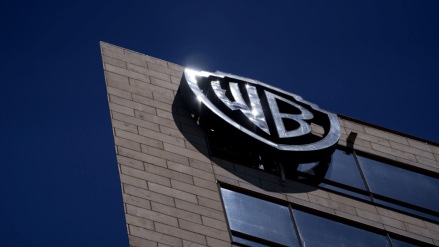Warner Bros Discovery shares fell the most on record after the entertainment giant reported a drop in TV network advertising and signaled the market may remain challenged next year.
Advertising revenue in the traditional TV business fell 12% to $1.7 billion in the third quarter, the company reported Wednesday. The hit weighed on profitability and led to third-quarter a loss of 17 cents a share, wider than Wall Street estimates of an 8.6-cent loss, according to data compiled by Bloomberg.
While advertising in the company’s streaming TV business has grown, “the timing of an ad recovery is currently difficult for any of us to predict with any conviction,” Chief Financial Officer Gunnar Wiedenfels told investors on a conference call.
Absent a recovery in the TV ad market, Warner Bros is unlikely to meet its debt reduction goal for 2024, Wiedenfels said.
Shares of Warner Bros slid 19% to $9.40 Wednesday in New York. It’s the biggest one-day decline since the company, created by the merger of Discovery and WarnerMedia, began trading in April 2022.
Warner Bros, one of the biggest film and TV producers, generates almost half of its revenue from traditional ad-dependent TV networks such as CNN and TNT, which have been losing viewers and sponsors to streaming and other web-based services.
The company’s direct-to-consumer unit, which includes the Max streaming service, reported a surprise profit, with adjusted earnings of $111 million before interest, taxes, depreciation and amortization in the three months ended in September. Analysts had been expecting a loss of $125 million.
Subscribers to the company’s streaming services declined as Warner Bros. has been adding programming from its Discovery+ service to Max, prompting many customers to cancel. Domestic subscribers fell by 1 million from a year earlier to 52.6 million.
New York-based Warner Bros follows other media companies like Paramount Global in reporting narrower losses in streaming. Media companies have been raising prices on their streaming services and introducing new ad-supported plans to boost revenue in those businesses. Revenue in the streaming unit was up 5% to $2.44 billion.
Profitability in the streaming business was ‘reassuring’, according to Bloomberg Intelligence analyst Geetha Ranganathan. She said it’s “well on its way to becoming a sustainable, long-term earnings growth driver.” Overall revenue trends remained “a bit choppy” however, due to the decline in TV ads, she said.
Warner Bros reported sales of $9.98 billion, in line with the average analyst forecast. And while de-leveraging can be a positive for investors, MoffettNathanson analyst Robert Fishman believes “any speed bumps or concerns about a company’s ability to reduce debt or see cash flows below expectations will be painful for equity owners.”
The Barbie movie was of course a bright spot. The highest grossing film in the company’s history helped compensate for weakness in sales of TV shows to other outlets due to the twin strikes by Hollywood actors and writers.
